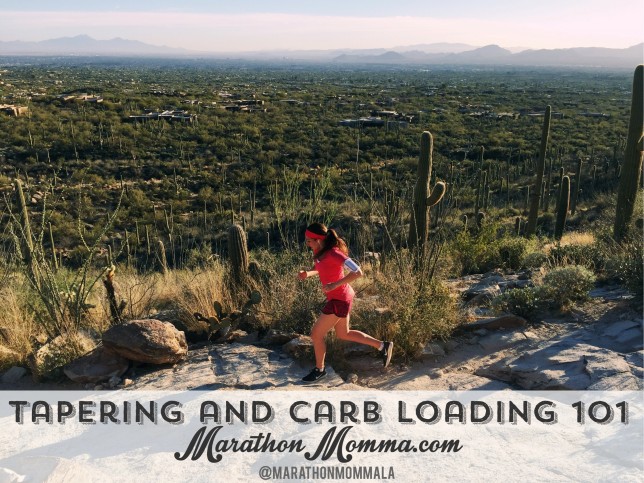Back in the days when my dad was running marathons 30 years ago, there wasn’t a lot of science behind distance running. Eating right, medical knowledge of effects on the body, and gear such as running shoes was largely unknown. People just went out there and gutted it out. (Talk about hard core!) As distance running evolved, my dad incorporated what became the fundamentals. He learned the art of tapering and carb loading and was a 2:37 marathoner himself. He passed his knowledge on to me at a very young age and I have since tried to master these two important fundamentals while toeing countless starting lines. So here I pass what I’ve learned on to you!
Tapering for Race Day 101
What is tapering?
To taper, or tapering, is the act of decreasing your mileage or exercise prior to a race. It has been studied and proven to be essential for the ideal performance. Depending on the length of the race you are participating in, it can last anywhere from one to three weeks before race day.
Why should you taper?
As you make your way through a training cycle, you have put your body through a lot of hard work! The process of tapering can help and correct the wear and tear that your muscles have sustained. According to a study in the International Journal of Sports Medicine, tapering, when done right, can improve times by 3% which can translate to several minutes off of a marathon time!
How to taper?
According to one of my favorite running resources, Advanced Marathoning by Pete Pfitzinger and Scott Douglas, they give some great tips.
Key Principles for Marathon Tapering:
– Begin tapering 3 weeks before your marathon.
– Maintain training intensity.
– Reduce mileage.
– Make recover days easy, or take days off.
– Optimize recovery strategies with proper diet and hydration.
– Eliminate muscle tightness with stretching, physical therapy, massage, and rest.
Carb Loading 101
What is carb loading?
The Mayo Clinic defines a carb loading diet:
A carbohydrate-loading diet, also called a carb-loading diet, is a strategy to increase the amount of fuel stored in your muscles to improve your athletic performance for endurance events.
Carbohydrate loading is a result of continuing to eat a high-carbohydrate “training diet” while scaling back your activity level during carbohydrate loading.
Why Should You Carb Load?
Benjamin Rapoport, a 2:55 marathoner himself and Harvard Medical grad, did extensive research on carb loading and the effects on the body. He said, “Proper carbo-loading—or filling your muscles to the brim with glycogen—won’t make you faster, but it will allow you to run your best and, if you race smartly, avoid the wall,” he says.
How Do You Carb Load?
Your goal for THREE days before your race is REST and FOOD. Try to stay off of your feet as much as possible- sit down and lie down as much as you can! Eat regular meals, and snack as much as possible.
The last TWO days before your race, try to get as many calories with the least amount of bulk (fiber). Fruit, vegetables, fiber, and protein are all good for you but NOT during this time. They will make you full without enough calories.
Foods With High Carb Content:
pasta, bread, oatmeal, bagels, energy bars, fig bars, cookies, shredded wheat, granola, muesli, pizza, brown rice, sweet potatoes, pancakes, potatoes, corn, and raisins.
Did you know?
Many of the world’s best marathoners eat rice for their preface meal? This is because of the high carbohydrate content and easy digestion.
By Friday night, you will be sick of these foods! It is common to gain a couple pounds and feel a little bloated, but don’t worry! Think of it as filling your body up with fuel for a great race day!
The Cleveland Clinic Center for Consumer Health tells us that the average 130 lb. marathoner burns 2,224 calories during a marathon, wow, right?
So needless to say, after all of your training, and effort on race day, you deserve to eat whatever you want!
I hope this helps you reach your goals and get in the game! Heather and I are ridiculously excited to run the Phoenix Marathon next weekend so this is what you will find us doing for the next week!
We love running marathons so much!
Read about my last marathon, a true epic adventure HERE. It involves running one of the hilliest marathons hoping to qualify for Boston, and then driving across the country with my family as soon as I finished! Yep, it was crazy!
Read about Heather’s latest marathon, HERE at Big Cottonwood 2015 and how she prepared for the perfect race hoping to qualify for Boston. An injury got the best of her race that day, but she prepared well and bounced back strong. Phoenix will be her 13th full marathon.
Thank you for all of your feedback through e-mail, instagram, and twitter. Keep it up, I love hearing from you!
XoXo,
Laura
Share This:



That’s great advice. I have run 3 marathons, 2 1/2 marathons, Ragnar trail and road races and am now wanting to prepare for a 1/2 marathon at the grand canyon. My problem over the years had been having intestinal issues during the race (if you know what I mean!) How do you avoid this? All those carbs for three days sound like it would stop me up!! all your tips would be appreciated. I turned 50 and am hoping to continue running, Lord willing!!
all your tips would be appreciated. I turned 50 and am hoping to continue running, Lord willing!!
Way to go! Feel free to e-mail us personally about this! marathonmommala@gmail.com. xo
My dad is a pretty accomplished runner himself and just like you said, he used to just go out there and run. The sport has really come a long way in research and the science of performance.